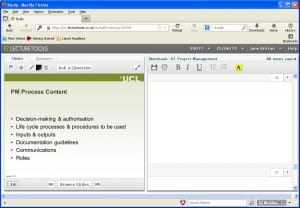HEA Senior Fellowship Case Study Series: 3 – Facilitating communities of practice at UCL and beyond
By Matt Jenner, on 14 August 2014
As a four-part series I am openly publishing my case studies previously submitted for my Senior Fellowship of the Higher Education Academy. I submitted my application in February 2014. If you’re interested in this professional recognition programme, please visit their webpages and look through the Professional Standards Framework (PSF). UCL runs an institutional model for fellowships called ARENA, your institution may run one too – speak to people!
Case study 3 – Facilitating communities of practice at UCL and beyond
At UCL I have facilitated and been involved in two active communities of practice. One external group called ‘Moodle User Group Greater London’ (MUGGL)[1] is for e-learning professionals with an interest in ‘Moodle’ – an online learning environment. More historically, I helped this community have an agenda for meetings with a colleague, Sarah Sherman in a neighbouring university consortia the ‘Bloomsbury Learning Environment’ [2]. The other, the ‘Distance Learning, CPD and Short Courses Network’[3], is an internal network I help steer for colleagues at UCL. These communities focus on “sharing best practices and creating new knowledge to advance a domain of professional practice”[4]. Drawing on my enthusiasm for e-learning and connecting people, the communities I facilitate take me beyond my desk and into the wider sector (A5, V3, V4).
People often disappear into enclaves, with daily priorities overarching valuable reflective opportunities. I work responsively to sustain and grow communities with common needs, values, locale and domain of discourse. All too often communities around information technology end up as one-way monologs beset by dry jargon. Instead I plan active pedagogically-focused sessions and encourage sharing and collaboration. This provides a vital source of information, future utility (V3) and cross-sector discovery (A4).
I regularly participate in wider CPD events and read literature in the areas of distance learning, MOOCs (Massive Online Open Courses) and e-learning to remain current in my understanding and share my experiences within networks and social media (V3). For the internal community, I organise and deliver centralised updates from professional services and the wider context of relevant developments so colleagues can gain purview of the changing landscape of higher education and e-learning (V4).
Both communities started three to four years ago as special interest groups created around particular foci. I have encouraged expansion of both networks, with events often attracting 50–150 people and a core membership of many times that figure. With this increasing range of members I must ensure to maintain respect for the needs of the group when planning three-four hours of their professional development time (V1). Communities are grown, not constructed, and sharing and learning cannot be “legislated into existence”[5]. I sideline my leadership in alignment with members’ interests to ensure events are planned with consultation and encouragement for active participation in each session. I make events accessible by adding remote attendance options and capturing them on video, to encourage participation and preserve inclusion for the diverse members of the community (V2).
I have received feedback stating I “did a great job organizing everyone and your presentation was beautiful”. Comments for MUGGL events have noted a “big crowd for the #muggl Moodle 2 meeting today” and “spent the morning at #muggl good presentations from @mattjenner […] we watch and learn!” Connecting people is an integral part, with one group visit commenting “how proud we are to work in such an engaging institution. Most participants left inspired”. In relation to expanding the community a senior member of staff spoke of a well-attended event that “the increase in numbers and interest across campus reflects the importance of this area”. Feedback is can be sporadic, but I take comments on board for future sessions and resolving any issues.
(515 words)
Areas of Activity
- A4 Develop effective learning environments and approaches to student support and guidance
- A5 Engage in continuing professional development in subjects/disciplines and their pedagogy, incorporating research, scholarship and the evaluation of professional practices
Professional Values
- V1 Respect individual learners and diverse learning communities
- V2 Promote participation in higher education and equality of opportunity for learners
- V3 Use evidence-informed approaches and the outcomes from research, scholarship and continuing professional development
- V4 Acknowledge the wider context in which higher education operates recognising the implications for professional practice
[1] https://sites.google.com/site/moodlelondon/
[2] http://www.bloomsbury.ac.uk/ble
[3] https://www.mailinglists.ucl.ac.uk/mailman/listinfo/distancelearning
[5] Dubé, L., Bourhis, A. & Jacob, R. (2005). The impact of structuring characteristics on the launching of virtual communities of practice. Journal of Organizational Change Management, 18(2): 145-166.
 Close
Close





